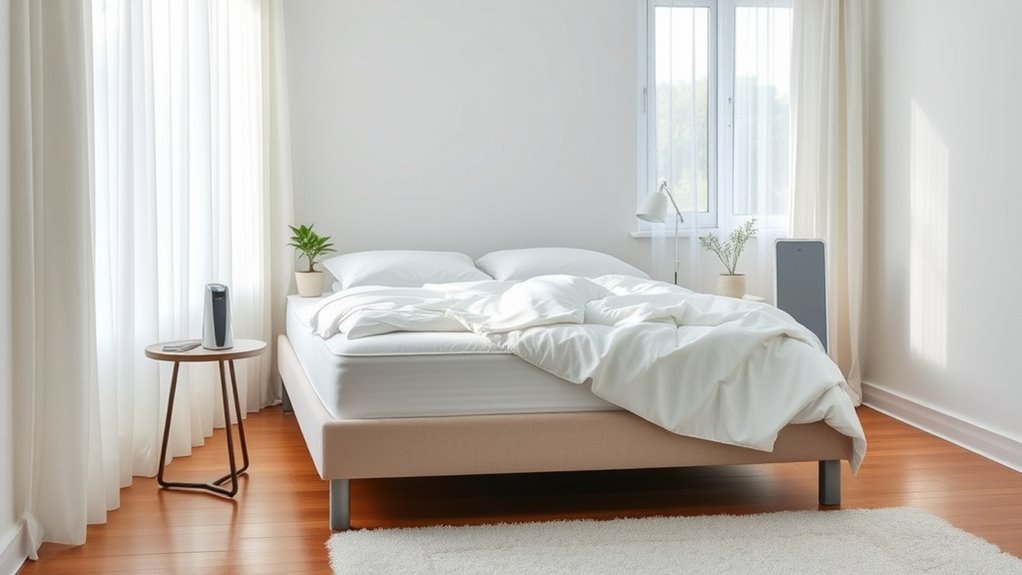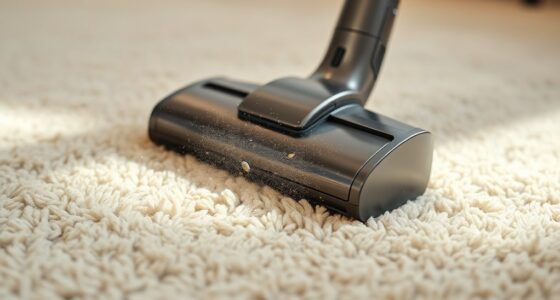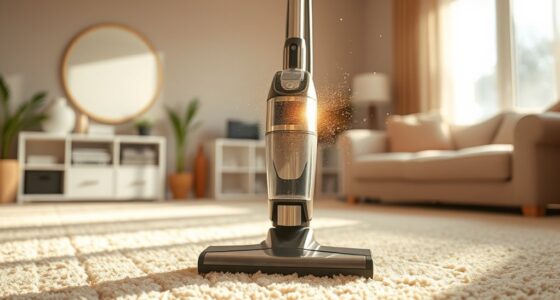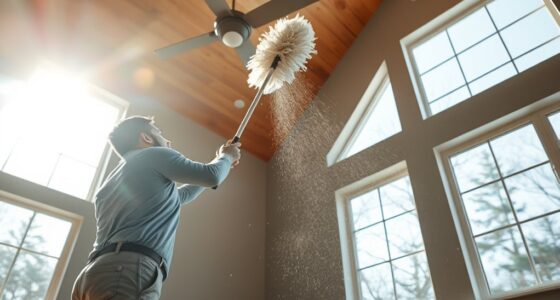To allergy-proof your bedroom, start by investing in hypoallergenic bedding, like pillows and mattress covers, and wash them regularly in hot water. Keep your space clutter-free and dust often, using a vacuum with a HEPA filter. Place an air purifier near your bed to filter out allergens, and avoid opening windows during high pollen seasons. These changes can considerably enhance your sleep quality. Learn more about creating an allergen-free sanctuary for better rest!
Key Takeaways
- Invest in hypoallergenic bedding, including pillows and mattress covers, to resist dust mites and allergens.
- Use an air purifier near the bed to effectively filter airborne allergens while ensuring it doesn’t disrupt sleep.
- Reduce clutter by minimizing knick-knacks and regularly dusting surfaces to prevent allergen accumulation.
- Keep windows closed during high pollen seasons to avoid introducing outdoor allergens into your bedroom.
- Regularly wash bedding in hot water to maintain its hypoallergenic properties and ensure a fresh sleep environment.
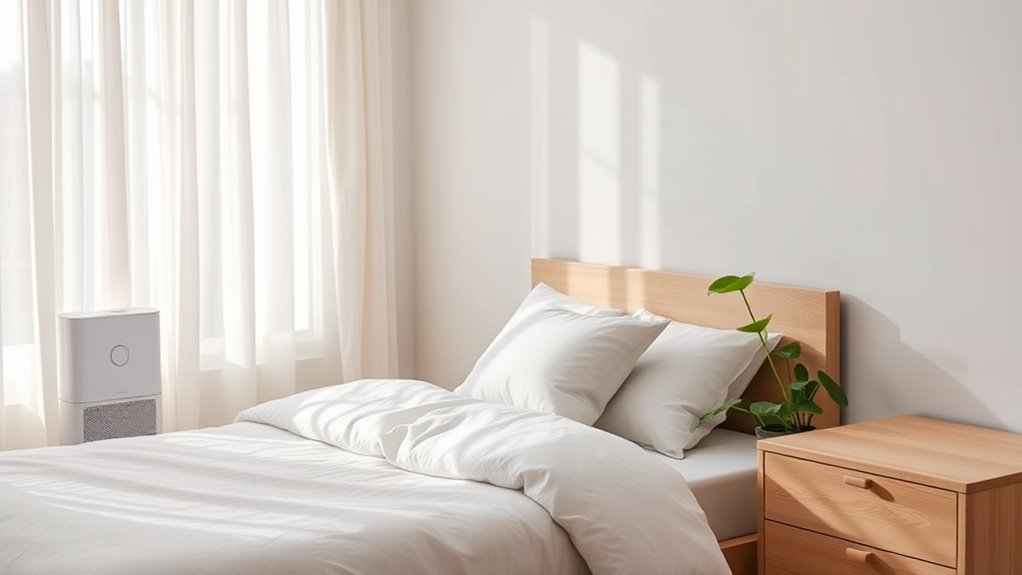
When you contemplate that a third of your life is spent sleeping, it’s essential to create an environment that minimizes allergens in your bedroom. Your sleep quality can greatly influence your overall health and well-being, so making a few strategic changes can really make a difference. Start by evaluating your current bedroom setup and identifying potential allergen sources that could disrupt your rest.
One of the simplest yet most effective changes you can make is to invest in hypoallergenic bedding. This type of bedding is specifically designed to resist dust mites, mold, and other common allergens. By switching to hypoallergenic pillows, mattress covers, and sheets, you’ll create a more inviting sleep environment. Make sure to wash your bedding regularly in hot water to maintain its hypoallergenic properties and keep allergens at bay. This not only helps in keeping your bed fresh but also guarantees that you’re sleeping on a clean surface free from irritants.
Another important aspect to take into account is air purifier placement. An air purifier can considerably reduce airborne allergens, so choosing the right spot for it is essential. Ideally, you should position the air purifier in a location where it can effectively circulate air throughout the room. Placing it near your bed can help filter out allergens while you sleep, but make sure it’s not too close, as the noise might disrupt your rest. You’ll want to avoid corners, as this can limit airflow; instead, opt for an open space in your bedroom to maximize its efficiency.
Additionally, keep your bedroom clutter-free. Dust and pet dander can accumulate on surfaces, so it’s wise to minimize knick-knacks and other items that can trap allergens. Regularly dust and vacuum your room, using a vacuum with a HEPA filter to guarantee that you’re capturing as many allergens as possible. Don’t forget to pay attention to your curtains and carpets, as they can also harbor dust and other allergens.
Finally, think about keeping your windows closed during high pollen seasons. Fresh air is great, but it can also bring in unwanted allergens. By following these steps, you’ll create a sanctuary in your bedroom, allowing you to sleep soundly and wake up refreshed, free from the disruptions that allergens can cause. With a bit of effort, you can allergy-proof your sleeping space and enjoy the restful nights you deserve. Additionally, consider using hypoallergenic bedding to further reduce exposure to allergens while you sleep.
Frequently Asked Questions
Can Pets Be Allergy-Proofed Out of the Bedroom?
Yes, you can effectively allergy-proof your bedroom by keeping pets out. If you’re considering a pet, think about hypoallergenic breeds that produce fewer allergens. Regular grooming and cleaning can also help with pet allergen reduction. Use HEPA filters in your bedroom to capture airborne particles, and wash bedding frequently. By taking these steps, you’ll create a more comfortable environment for yourself while still enjoying the companionship of your furry friends elsewhere in your home.
How Often Should I Wash My Bedding for Allergy Relief?
To keep your bedding fresh and inviting, wash it every week. Think of it as giving your sleep sanctuary a rejuvenating spa day. Regular mattress maintenance is essential too; vacuum it monthly to banish dust mites. Opt for hypoallergenic bedding materials, like cotton or microfiber, that trap fewer allergens. By treating your bedding right, you not only improve your sleep but also create a healthier environment for yourself. Embrace this routine—it’s worth it!
What Air Purifiers Are Best for Allergies?
When choosing an air purifier for allergies, look for models with HEPA filters for ideal allergen removal efficiency. These filters capture 99.97% of particles as small as 0.3 microns, including pollen and dust mites. Consider units with activated carbon filters for odors and VOCs. Features like a fan speed adjustment and air quality indicators can enhance performance. Make sure to choose a suitable size for your room to maximize effectiveness.
Can I Use Essential Oils for Allergy Relief?
Yes, you can use essential oils for allergy relief! In fact, studies show that about 30% of adults experience allergic reactions. Essential oil blends like lavender and eucalyptus can help reduce symptoms by acting as natural anti-inflammatories. While they won’t replace traditional allergy relief methods, diffusing these oils or adding them to a steam inhalation can provide comfort. Just verify you’re not allergic to the oils themselves before using them!
Are There Specific Houseplants That Help Reduce Allergies?
Yes, there are specific houseplants that help reduce allergies. Consider adding air purifying plants like spider plants, peace lilies, and snake plants to your home. These plants filter out pollutants and improve air quality. If you’re worried about allergens, hypoallergenic houseplants, such as bamboo palm and rubber plants, are great options too. They won’t trigger your allergies while still providing the benefits of cleaner air. Enjoy a fresher, healthier living space!
Conclusion
By taking a few simple steps, you can create a sanctuary that keeps allergies at bay. Did you know that nearly 50 million Americans suffer from allergies each year? With measures like using hypoallergenic bedding and regularly cleaning your space, you can markedly reduce allergens in your bedroom. Don’t let allergies disrupt your sleep—implement these tips and enjoy a healthier, more restful haven. Your body will thank you for it!
